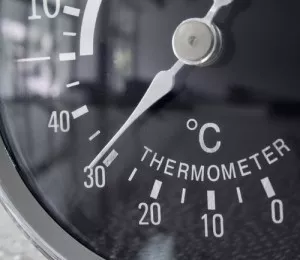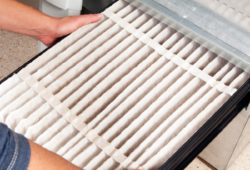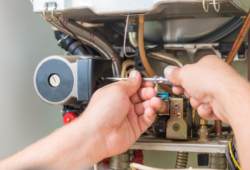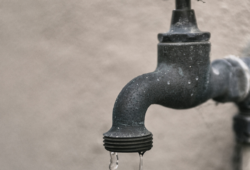How Humidity Affects Heating & Cooling in Your Raleigh Home

The humidity level in a home has a direct impact on heating and cooling. The amount of moisture in the air influences our perception of how warm or cold we feel. Warm air holds more moisture than cold, so high humidity makes it harder to make a home feel comfortably cool on a hot summer day. Because there’s less moisture in cooler air, it’s more difficult to make a dwelling feel warm and cozy in the winter. You can eliminate the effects of too much or too little moisture, and heat and cool your home more efficiently, by maintaining humidity between 35 and 45 percent.
Want to know more about how humidity affects heating and cooling costs? Read on, and contact us today with any questions you may have about your home’s HVAC!
How High Humidity Affects Cooling
Both heat pumps and AC units cool by drawing heat and water vapor from the air, but they have a finite amount of cooling capacity. On days when the outdoor temperature and humidity level are extremely high, the equipment has to work harder to compensate. If it doesn’t have sufficient capacity, it won’t remove enough moisture from the air. When the system is coping with high humidity, it can’t cool effectively, so it’s not able to reduce the ambient temperature as much as it normally would.
Some of the telltale signs of a lack of adequate dehumidification include:
- A hot, sticky indoor environment, even when the cooling equipment is running constantly
- Condensation on the windows
- Unpleasant musty odors
- Mold and mildew growth, especially in the bathrooms
- Moisture damage to ceilings, walls, paint, carpeting, wood floors, trim and structural components
- Increased energy consumption and higher utility bills
- Worsened allergies and increased breathing difficulties for those with asthma, chronic bronchitis, heart conditions and emphysema
Correct Equipment Sizing and Home Humidity Levels
If the equipment cooling your Raleigh home wasn’t sized accurately, it may have too much capacity for the space. When your air conditioner or heat pump is too large, it will cycle on, quickly reach the thermostat’s target temperature, and then cycle off again. These short cooling cycles don’t allow the equipment enough time to remove moisture properly, so the humidity level in your home stays too high. Replacing over-sized equipment can help resolve high humidity issues, especially if you opt for a variable speed blower to enhance air circulation.
How to Solve a High Home Humidity Problem
When high indoor humidity is brought under control, cooling equipment performs more efficiently, comfort increases, and energy consumption and operating costs decrease. There are number of steps that you can take to help rid your home of excess humidity, such as:
- Having the ductwork properly sealed and insulated to stop moisture from entering the system from unconditioned spaces
- Ensuring that the clothes dryer is vented outdoors
- Using vented exhaust fans in the bathrooms and kitchen to eliminate water vapor from bathing, showering and cooking
- Adding a dehumidifier to the HVAC system, which works in tandem with the cooling equipment to keep humidity levels within an acceptable range
- Cleaning out the HVAC system’s drain line regularly so it stays free of blockages
The Impact of Humidity on Home Heating
When outdoor temperatures fall in the winter months, the amount of moisture in the air drops too. You may try dialing up the thermostat to compensate for chilly, dry air, but it doesn’t solve the problem. It only increases energy consumption and pushes your heating costs higher. When low humidity isn’t corrected, it can cause:
- Health complaints such as nasal and throat irritation, dry, chapped lips and skin, and greater susceptibility to colds and respiratory infections
- Issues with static electricity that can harm electronics
- Shrinking or cracking of caulk and wood floors, trim, and furniture
How to Combat Low Home Humidity During Heating Season
To make life more comfortable, preserve your home and its contents and help your heating system perform optimally, you need to add moisture to the indoor air. One option is to use portable humidifiers in different rooms of your home, but it’s essential that the output of each unit matches the size of the room or you could add too much moisture.
The most efficient way to increase home humidity is with a whole-house humidifier. These units are installed in a home’s HVAC system and add just the right amount of moisture to the air that’s circulating through the ductwork. A trusted HVAC professional is your best source of advice and assistance with sizing, selection, and installation.
Call Air Experts for More Information on Indoor Air Quality
To learn more about how home humidity affects heating and cooling, as well as indoor air quality, in your Raleigh area home, you can count on the professionals at Air Experts. We have been the go-to HVAC company for all humidity and indoor air quality issues since 1986.
For those living in Raleigh, Durham, Chapel Hill and the surrounding areas, we invite you to explore our website and learn more about the many benefits of owning a modern, energy efficient heating and air conditioning system.
Have questions about your home’s humidity levels? Contact Air Experts online or give us a call at 919-480-2727 —we look forward to speaking with you!




